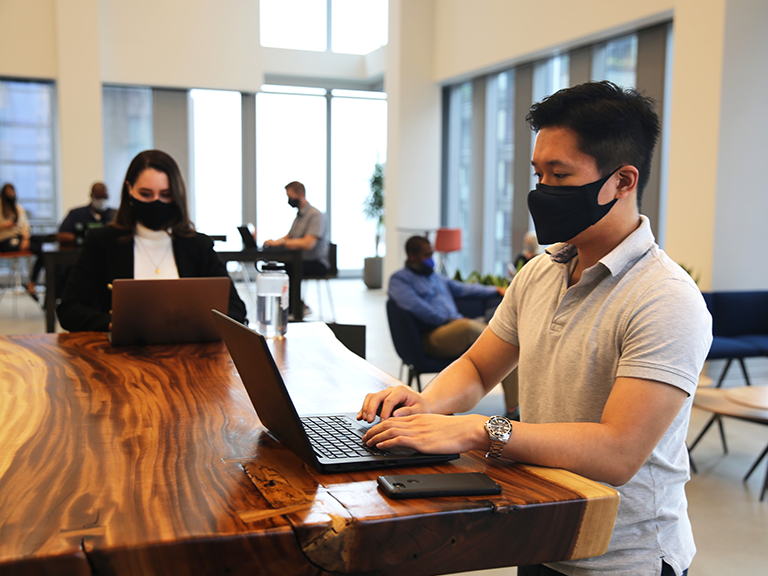
“Recruiting from everywhere — and not requiring people to move to get hired — is an approach we are optimistic will help us achieve the level of representation our industry needs, and I hope it is something all technology companies will consider.” — Dan Spaulding, Zillow Chief People Officer
Something fascinating happened at Zillow since the fall of 2020 when we told our team members that most would not be asked to return to the office full time: a significant number decided to move.
So far, 700 Zillow Group employees — almost 13% of our workforce — have relocated. Nearly 200 of those moved to a different state. Today, about nine Zillow employees a week tell us they’ve relocated. These moves represent a pivotal moment in Zillow’s journey to allow team members to work where they are happiest and most productive, and to make commutes largely a thing of the past.
Now, as Zillow sets its sights on recruiting 2,000 new hires this year —growing our workforce by 40% — we believe our status as a cloud-headquartered company is a competitive advantage, especially when it comes to recruiting talent more representative of the communities in which we do business. Now, we can recruit from almost everywhere in the country, with no requirement that people uproot their lives to work for us.

Zillow has always had amazing offices. We invest in beautiful, collaborative spaces with treadmill desks and even a “candy wall.” These amenities racked up plenty of “great place to work” awards. However, in 2020, we were among the first to announce that employees could work from home indefinitely. Then, while other companies debated what to do when the pandemic eases, we saw an opportunity to permanently redefine the future of flexible work. We decided to operate Zillow as a cloud-headquartered company and set the standard for what a post-pandemic workplace culture looks like.
Today, 90% of employees have the flexibility to work where they are most productive: the office, home, or a combination. The shift was not made to save money but instead based on trust in our employees to deliver, regardless of location. And in overwhelming numbers, they told us they want to work remotely all or most of the time.
Those of us at Zillow believe the future of work is anchored in a shared mission, not a shared physical location.
Zillow employees haven’t missed a beat while working from home. We have run large and successful product development and sales teams and accelerated product launches. While we did all that, revenue grew by 22% in 2020, despite the negative, early impacts of the pandemic on our business.
We now believe an office-tethered talent pipeline made it more difficult to recruit a more representative workforce. Not everyone wants to move to a large city. For most tech companies, that means a disproportionate number of hires come from cities such as Seattle and San Francisco, which are home to a large pool of tech-talent, but are less diverse than the country at large. We now have employees in all 50 states.
Recruiting from everywhere — and not requiring people to move to get hired — is an approach we are optimistic will help us achieve the level of representation our industry needs, and I hope it is something all technology companies will consider. We all recognize the value representative workforces bring to our businesses, and the responsibility we have around ensuring our employee base looks like the communities around us. We should recognize that meeting new employees where they live — literally —is a powerful new addition to our recruitment toolbox.
While other companies debated what to do when the pandemic eases, we saw an opportunity to permanently redefine the future of flexible work.
As exciting as all these changes to the way we work and recruit are, we still have plenty to learn. For example, we need to ensure a level playing field for team members regardless of their physical location. We also recognize that working from home is not the most productive option for everyone. Zoom fatigue, the pressure of providing childcare because schools are closed, and dealing with small spaces and roommates are among the problems we aim to help our employees solve. That’s why we recently announced new “prime collaboration hours,” when we encourage most meetings to occur, and are leaning into asynchronous approaches to work outside of those hours. The goal is to help employees reduce meeting-fatigue and increase opportunities for focused work. At the same time, we’re re-imagining our in-office experiences to create cutting-edge spaces for bringing people together when the time is right.
Those of us at Zillow believe the future of work is anchored in a shared mission, not a shared physical location. In Zillow’s case, that mission is reimagining real estate to make it easier than ever to move from one home to the next. Join us: https://www.zillow.com/careers/